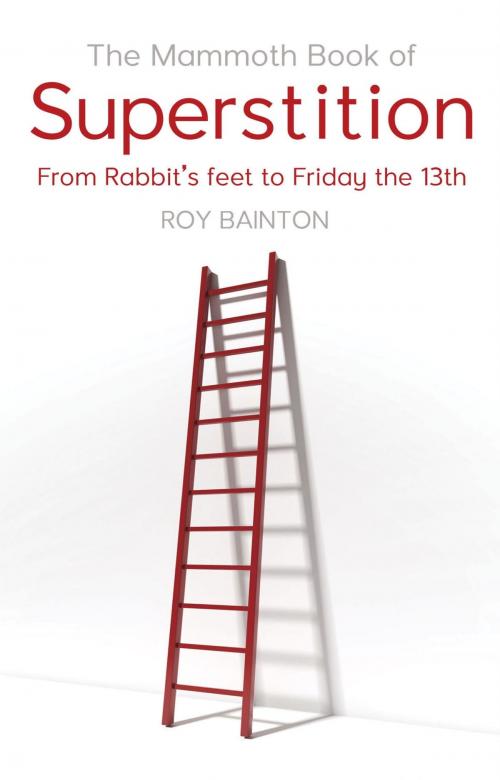The Mammoth Book of Superstition
From Rabbits' Feet to Friday the 13th
Nonfiction, Social & Cultural Studies, Social Science, Folklore & Mythology| Author: | Roy Bainton | ISBN: | 9781472137470 |
| Publisher: | Little, Brown Book Group | Publication: | November 10, 2016 |
| Imprint: | Robinson | Language: | English |
| Author: | Roy Bainton |
| ISBN: | 9781472137470 |
| Publisher: | Little, Brown Book Group |
| Publication: | November 10, 2016 |
| Imprint: | Robinson |
| Language: | English |
Rather than providing a dictionary of superstitions, of which there are already numerous excellent, exhaustive and, in many cases, academic works which list superstitions from A to Z, Bainton gives us an entertaining flight over the terrain, landing from time to time in more thought-provoking areas. He offers an overview of humanity's often illogical and irrational persistence in seeking good luck and avoiding misfortune.
While Steve Roud's two excellent books - The Penguin Dictionary of Superstitions and his Pocket Guide - and Philippa Waring's 1970 Dictionary concentrate on the British Isles, Bainton casts his net much wider. There are many origins which warrant the full back story, such as Friday the thirteenth and the Knights Templar, or the demonisation of the domestic cat resulting in 'cat holocausts' throughout Europe led by the Popes and the Inquisition.
The whole is presented as a comprehensive, entertaining narrative flow, though it is, of course, a book that could be dipped into, and includes a thorough bibliography.
Schoenberg, who developed the twelve-tone technique in music, was a notorious triskaidekaphobe. When the title of his opera Moses und Aaron resulted in a title with thirteen letters, he renamed it Moses und Aron. He believed he would die in his seventy-sixth year (7 + 6 = 13) and he was correct; he also died on Friday the thirteenth at thirteen minutes before midnight.
As Sigmund Freud wrote, 'Superstition is in large part the expectation of trouble; and a person who has harboured frequent evil wishes against others, but has been brought up to be good and has therefore repressed such wishes into the unconscious, will be especially ready to expect punishment for his unconscious wickedness in the form of trouble threatening him from without.'
Rather than providing a dictionary of superstitions, of which there are already numerous excellent, exhaustive and, in many cases, academic works which list superstitions from A to Z, Bainton gives us an entertaining flight over the terrain, landing from time to time in more thought-provoking areas. He offers an overview of humanity's often illogical and irrational persistence in seeking good luck and avoiding misfortune.
While Steve Roud's two excellent books - The Penguin Dictionary of Superstitions and his Pocket Guide - and Philippa Waring's 1970 Dictionary concentrate on the British Isles, Bainton casts his net much wider. There are many origins which warrant the full back story, such as Friday the thirteenth and the Knights Templar, or the demonisation of the domestic cat resulting in 'cat holocausts' throughout Europe led by the Popes and the Inquisition.
The whole is presented as a comprehensive, entertaining narrative flow, though it is, of course, a book that could be dipped into, and includes a thorough bibliography.
Schoenberg, who developed the twelve-tone technique in music, was a notorious triskaidekaphobe. When the title of his opera Moses und Aaron resulted in a title with thirteen letters, he renamed it Moses und Aron. He believed he would die in his seventy-sixth year (7 + 6 = 13) and he was correct; he also died on Friday the thirteenth at thirteen minutes before midnight.
As Sigmund Freud wrote, 'Superstition is in large part the expectation of trouble; and a person who has harboured frequent evil wishes against others, but has been brought up to be good and has therefore repressed such wishes into the unconscious, will be especially ready to expect punishment for his unconscious wickedness in the form of trouble threatening him from without.'















